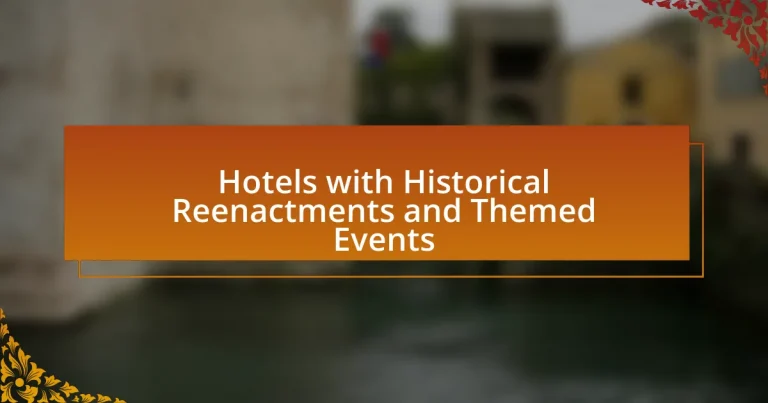Hotels with historical reenactments and themed events provide immersive experiences that allow guests to engage with history through activities, decor, and performances. These accommodations often host events such as Civil War reenactments, medieval banquets, and themed festivals, enhancing the guest experience by combining entertainment with education. The article explores how these hotels incorporate historical themes, the types of events commonly reenacted, and the unique experiences they offer. It also discusses the role of storytelling, the popularity of these events in the hospitality industry, and how local cultures influence themed activities, ultimately contributing to local tourism and guest satisfaction.

What are Hotels with Historical Reenactments and Themed Events?
Hotels with historical reenactments and themed events are accommodations that offer guests immersive experiences by recreating historical events or themes through activities, decor, and performances. These hotels often host events such as Civil War reenactments, medieval banquets, or themed festivals that allow guests to engage with history in a unique way. For example, the Gettysburg Hotel in Pennsylvania frequently organizes Civil War reenactments, providing guests with a firsthand look at historical events. Such experiences enhance the stay by combining hospitality with educational and entertaining elements, making history accessible and engaging for visitors.
How do these hotels incorporate historical reenactments?
Hotels incorporate historical reenactments by organizing immersive events that recreate significant historical moments relevant to their location. These events often include costumed actors portraying historical figures, interactive storytelling, and themed activities that engage guests in the history of the area. For example, some hotels may host Civil War reenactments or Victorian-era balls, allowing guests to participate in dances or witness battles, thereby enhancing their understanding of the past. This approach not only entertains but also educates visitors about local history, making the experience memorable and enriching.
What types of historical events are commonly reenacted?
Commonly reenacted historical events include battles, significant political events, and cultural festivals. For instance, the American Civil War battles are frequently reenacted, with events like the Battle of Gettysburg drawing thousands of participants and spectators each year. Additionally, events such as the signing of the Declaration of Independence and various Renaissance fairs showcase historical moments and cultural practices, allowing participants to experience history firsthand. These reenactments serve educational purposes and foster community engagement, highlighting their importance in preserving historical narratives.
How do hotels select the themes for their events?
Hotels select themes for their events by analyzing market trends, guest preferences, and seasonal opportunities. They often conduct surveys and gather feedback from previous events to understand what resonates with their clientele. Additionally, hotels may collaborate with event planners and local cultural organizations to ensure themes align with community interests and historical significance. For instance, a hotel in a historically rich area might choose a theme that reflects local heritage, enhancing guest experience and engagement. This strategic approach ensures that the selected themes are relevant, appealing, and capable of attracting a diverse audience.
What unique experiences do these hotels offer to guests?
Hotels with historical reenactments and themed events offer immersive experiences that transport guests to different time periods. For example, some hotels host Civil War reenactments, allowing guests to witness battles and participate in period-specific activities, enhancing their understanding of history. Additionally, themed events such as Victorian tea parties or medieval banquets provide guests with authentic culinary experiences and entertainment reflective of the era. These unique offerings not only educate but also engage guests in a memorable way, making their stay more than just accommodation.
How do themed events enhance the guest experience?
Themed events enhance the guest experience by creating immersive environments that engage participants on multiple sensory levels. These events often incorporate elements such as period-specific decor, costumes, and activities that transport guests to a different time or place, fostering a deeper emotional connection to the experience. For instance, historical reenactments allow guests to witness and participate in events that reflect the culture and traditions of a specific era, enriching their understanding and appreciation of history. Research indicates that immersive experiences can significantly increase guest satisfaction and retention, as they provide unique memories that standard offerings cannot replicate.
What role does storytelling play in these events?
Storytelling serves as a fundamental mechanism in hotels with historical reenactments and themed events by creating immersive experiences that engage guests emotionally and intellectually. This narrative-driven approach enhances the authenticity of the events, allowing participants to connect with history on a personal level. For instance, reenactments often incorporate detailed stories about historical figures or events, which can be supported by historical documents or expert interpretations, thereby enriching the educational aspect of the experience. Such storytelling not only entertains but also fosters a deeper understanding of the cultural and historical context, making the events memorable and impactful for attendees.
Why are historical reenactments popular in the hospitality industry?
Historical reenactments are popular in the hospitality industry because they enhance guest experiences by providing immersive, educational entertainment. These events attract visitors seeking unique and engaging activities, allowing hotels to differentiate themselves in a competitive market. For instance, hotels that host reenactments of significant historical events can draw history enthusiasts and families, increasing occupancy rates and revenue. Additionally, studies show that themed events can lead to higher guest satisfaction and repeat visits, as they create memorable experiences that resonate with guests.
What trends are driving the interest in themed hotel experiences?
The trends driving interest in themed hotel experiences include the growing demand for unique and immersive travel experiences, increased social media influence, and a focus on personalized customer engagement. Unique experiences attract travelers seeking memorable stays, as evidenced by a 2019 study from the American Hotel and Lodging Educational Institute, which found that 70% of millennials prefer experiences over material goods. Social media platforms amplify this trend, with visually appealing themed hotels generating significant online buzz, leading to increased bookings. Additionally, hotels are leveraging personalized services and tailored events to enhance guest satisfaction, aligning with the broader hospitality industry’s shift towards experiential offerings.
How do these events contribute to local tourism?
Events such as historical reenactments and themed gatherings significantly enhance local tourism by attracting visitors interested in unique cultural experiences. These events create opportunities for hotels to offer specialized packages, drawing tourists who seek immersive experiences that connect them to the area’s history. For instance, a study by the National Trust for Historic Preservation found that heritage tourism, which includes events like reenactments, can increase local economic activity by up to 20%. This influx of visitors not only boosts hotel occupancy rates but also stimulates spending in local restaurants, shops, and attractions, thereby contributing to the overall economic vitality of the community.

What types of hotels feature historical reenactments and themed events?
Hotels that feature historical reenactments and themed events typically include boutique hotels, heritage hotels, and themed resorts. Boutique hotels often focus on unique experiences and may host events that reflect local history or culture. Heritage hotels, often located in historically significant buildings, provide immersive experiences that include reenactments of historical events relevant to the location. Themed resorts, such as those based on specific historical periods or events, create an environment where guests can participate in reenactments and themed activities, enhancing their overall experience. These types of hotels cater to guests seeking a blend of entertainment and education through interactive historical experiences.
How do boutique hotels differ from larger chains in this context?
Boutique hotels differ from larger chains in the context of hotels with historical reenactments and themed events by offering a more personalized and immersive experience. Boutique hotels typically focus on unique themes and local culture, often incorporating historical elements into their design and events, which enhances guest engagement. For instance, a boutique hotel may host specific reenactments that reflect the local history, creating a distinctive atmosphere that larger chains, which often prioritize standardized services and amenities, may not replicate. This focus on individuality allows boutique hotels to attract guests seeking authentic experiences, as evidenced by the growing trend of experiential travel, where 72% of travelers prefer unique experiences over traditional accommodations.
What are some examples of boutique hotels with unique themes?
Some examples of boutique hotels with unique themes include the Hotel del Coronado in California, which features a Victorian beach theme, and the Icehotel in Sweden, known for its ice and snow architecture. The Hotel del Coronado, built in 1888, is a National Historic Landmark that embodies the charm of the Victorian era, attracting visitors with its stunning beachfront and historical significance. The Icehotel, established in 1989, is rebuilt annually from ice and snow, showcasing intricate ice sculptures and offering a truly unique Arctic experience. These hotels exemplify how themed environments can enhance guest experiences through distinctive architectural styles and immersive atmospheres.
How do larger hotel chains implement historical themes?
Larger hotel chains implement historical themes by incorporating design elements, decor, and programming that reflect specific historical periods or events. For instance, hotels may restore or maintain historical architecture, use period-appropriate furnishings, and offer themed dining experiences that align with the historical context. Additionally, many chains host reenactments or events that celebrate local history, such as Civil War reenactments or Victorian tea parties, to engage guests and enhance their experience. This approach not only attracts history enthusiasts but also enriches the cultural narrative of the destination, as seen in properties like the Fairmont Banff Springs, which showcases Scottish baronial architecture and offers historical tours.
What geographical regions are known for these types of hotels?
Regions known for hotels with historical reenactments and themed events include the United States, particularly in areas like Colonial Williamsburg in Virginia, which offers immersive experiences in early American history. Additionally, Europe, especially countries like the United Kingdom and France, features hotels that host medieval-themed events and reenactments, such as those found in historic castles. These regions are recognized for their rich historical contexts and dedicated tourism efforts that promote such unique lodging experiences.
Which regions have the richest historical contexts for reenactments?
The regions with the richest historical contexts for reenactments include the American South, particularly Virginia and Gettysburg in Pennsylvania, as well as Europe, notably the United Kingdom and France. Virginia is home to numerous Civil War battlefields and reenactments, such as those at Manassas and Appomattox, which are significant for their historical impact on American history. Gettysburg is renowned for its pivotal role in the Civil War, hosting large-scale reenactments that attract thousands of participants and spectators. In Europe, the United Kingdom offers rich contexts through events like the English Civil War reenactments, while France features World War I and II reenactments, particularly in regions like Normandy, where D-Day took place. These areas are recognized for their deep historical significance and the frequency of organized reenactments that bring history to life.
How do local cultures influence themed events in hotels?
Local cultures significantly influence themed events in hotels by shaping the themes, activities, and overall guest experiences. For instance, hotels in regions with rich historical backgrounds often incorporate local traditions, folklore, and cuisine into their events, creating authentic experiences that resonate with both tourists and locals. A study by the International Journal of Hospitality Management highlights that hotels that integrate local cultural elements into their events see increased guest satisfaction and engagement, as these experiences provide a deeper connection to the destination. This cultural integration not only enhances the uniqueness of the events but also promotes local heritage and community involvement, making the themed events more meaningful and memorable for attendees.

How can guests make the most of their stay at these hotels?
Guests can make the most of their stay at hotels with historical reenactments and themed events by actively participating in the scheduled activities and immersing themselves in the unique experiences offered. Engaging in reenactments allows guests to gain a deeper understanding of the historical context and significance of the events being portrayed, enhancing their overall experience. Additionally, guests should take advantage of guided tours and workshops that often accompany these events, as they provide valuable insights and hands-on learning opportunities. Many hotels also offer themed dining experiences that reflect the historical period, allowing guests to enjoy authentic cuisine while further immersing themselves in the atmosphere.
What tips should guests consider when booking a themed hotel?
When booking a themed hotel, guests should prioritize their interests and the specific theme of the hotel to ensure an enjoyable experience. Guests should research the hotel’s theme, such as historical reenactments or specific events, to confirm it aligns with their preferences. Additionally, checking reviews and ratings can provide insights into the authenticity and quality of the themed experience, as well as the level of engagement offered by the hotel. It is also advisable to inquire about any special events or activities that coincide with their stay, as these can enhance the overall experience. Lastly, guests should consider the location and accessibility of the hotel to ensure it complements their travel plans and allows for easy participation in themed activities.
How can guests prepare for participation in reenactments?
Guests can prepare for participation in reenactments by researching the specific historical period and event they will be reenacting. Understanding the context, attire, and roles involved enhances authenticity and engagement. For example, guests should study the clothing styles, social norms, and significant events of the era to accurately portray characters. Additionally, practicing any required skills, such as period-specific crafts or combat techniques, can improve performance. Engaging with reenactment communities online or attending workshops can provide valuable insights and tips for a more immersive experience.
What should guests know about the schedule of events?
Guests should know that the schedule of events at hotels featuring historical reenactments and themed events typically includes specific times for performances, workshops, and guided tours. These events are often planned in advance and may vary by season or special occasions, so guests should check the hotel’s website or contact the front desk for the most current schedule. For example, many hotels provide a detailed itinerary upon check-in, ensuring guests can participate in all activities of interest.
What are the best practices for enjoying themed events?
To enjoy themed events, participants should fully immerse themselves in the theme by dressing appropriately and engaging with the activities offered. This enhances the experience and fosters a sense of community among attendees. Research indicates that active participation in themed events increases enjoyment and satisfaction, as seen in studies on event engagement. Additionally, planning ahead by reviewing the event schedule and participating in pre-event activities can maximize enjoyment, as it allows attendees to prioritize their interests and connect with others who share similar passions.
How can guests engage with the historical context during their stay?
Guests can engage with the historical context during their stay by participating in themed events and reenactments organized by the hotel. These events often include guided tours that highlight the hotel’s history, interactive performances that recreate historical moments, and workshops that teach traditional crafts or skills relevant to the era being represented. For instance, hotels may host Civil War reenactments or Victorian tea parties, allowing guests to immerse themselves in the culture and customs of the time. Such activities not only provide entertainment but also educate guests about the historical significance of the location, enhancing their overall experience.
What etiquette should guests follow during reenactments?
Guests should maintain respect for the historical context and participants during reenactments. This includes refraining from disruptive behavior, such as loud talking or using mobile devices, which can detract from the immersive experience. Additionally, guests should avoid touching props or costumes without permission, as these items are often valuable and integral to the performance. Observing the event quietly and following any specific guidelines provided by the organizers ensures a respectful atmosphere that honors the historical significance of the reenactment.


